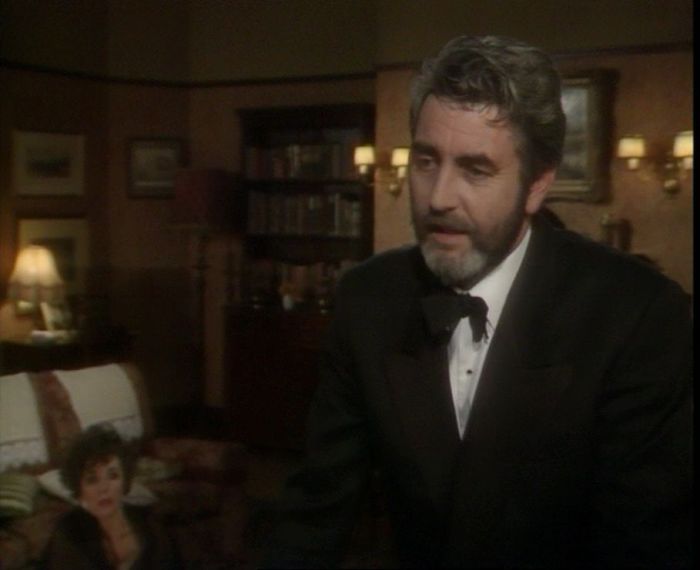
Vicky Gayforth’s (Joan Collins) life is collapsing around her. Following an evening at the theatre, she elects not to go on to a late party as she’s convinced that her husband – Simon (Simon Williams) – will be there with another woman. Taking three strong sleeping pills, Vicky is settling down for a peaceful night’s sleep when Simon enters her bedroom and requests a divorce.
As the pills begin to take effect, Vicky experiences multiple hallucinations as she relives her life with Simon in a series of highly theatrical vignettes ….
Described by Coward as “a musical fantasy”, Shadow Play is a very pleasing mix of reality and fantasy. It begins in the real world, with Vicky receiving sage advice from Aunt Martha (Jean Anderson). Anderson was the sort of actress who seemed to spend her career playing characters who dished out sage advice (whether the recipients wanted it or not). Seven years as the matriarch of the Hammond family in The Brothers for example.
Given how perfectly Simon Williams fits into the Tonight at 8:30 world, it’s a little surprising that this was his only role – but he certainly makes the most of it. When we first meet Simon Gayforth he’s behaving in a rather beastly fashion towards the somewhat helpless Vicky (who is one of those characters rather buffeted about by events). But once the fantasies begin and he turns on the charm it’s easy to understand why Vicky fell in love with him in the first place.
I like the way that the sets become very stagey and unreal once we join Vicky in her dream world (this distinction probably would have been harder to draw on stage). Presumably Coward and Gertrude Lawrence handled several of the songs themselves – but Collins and Williams don’t get involved in the singing (I can’t recall either of them warbling in the past, so this was probably a wise move).
As Vicky dreams on, she’s not above re-editing events to make them even better than the real thing.
Vicky: You’re nice and slim. Your eyes smile and you move easily. I’m afraid you’re terribly attractive.
Simon: You never said that!
Vicky: No, but I thought it.
Simon: Stick to the script.
This happens on a number of occasions – characters breaking the reality of the fantasy (if you see what I mean) to pass an ironic commentary on what we’re seeing. This would hardly have been original even back in the 1930’s, but it’s still amusing and effective.
Several Tonight at 8:30 stalwarts turn up for one final bow. Edward Jewesbury is the perplexed Uncle George, unwillingly dragged into Vicky’s dreamworld, whilst Edward Duke plays a silly young ass (something of his signature role).
Even when Vicky returns to reality, there’s still a tinge of fantasy in the air as Simon has banished all thoughts of divorce, meaning he and Vicky will live happily ever after. Is she still dreaming? Maybe, or maybe Coward was simply content to send the theatregoers home in a good mood.
Tonight at 8:30 is a fascinating series. Happy to faithfully adapt the original plays (if the action took place in a single room, then the productions would remain in a single room) it’s the sort of VT show which belongs to a vanished television age. It’s a pity that three episodes are rather marred by the addition of laugh tracks, but that quibble apart it’s been something that I’ve enjoyed revisiting. Certainly worth a look if you have the Noel Coward DVD boxset on your shelf.
















